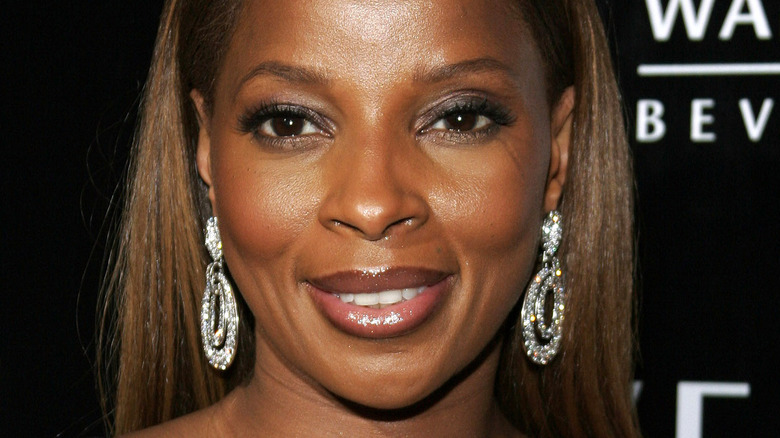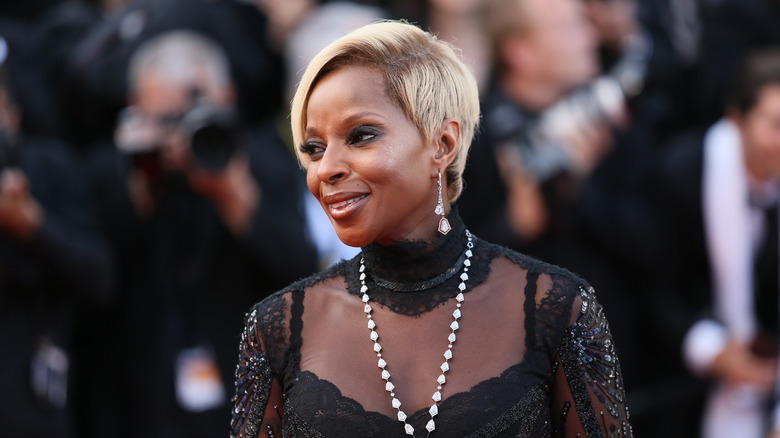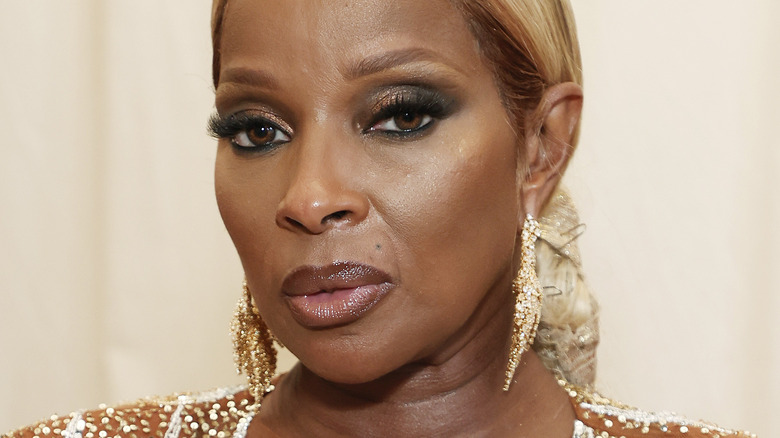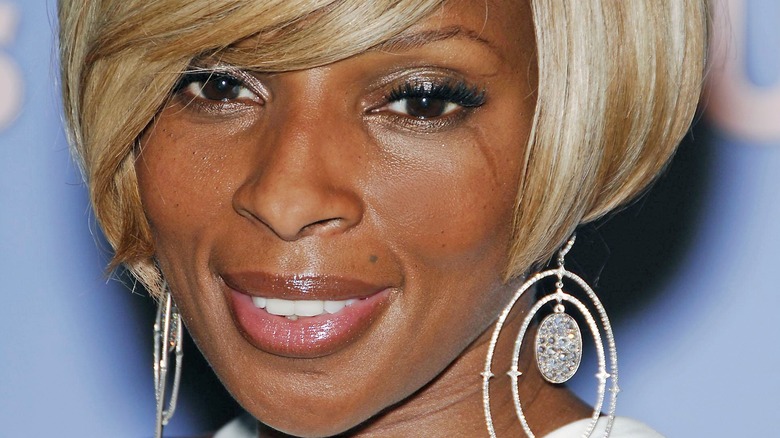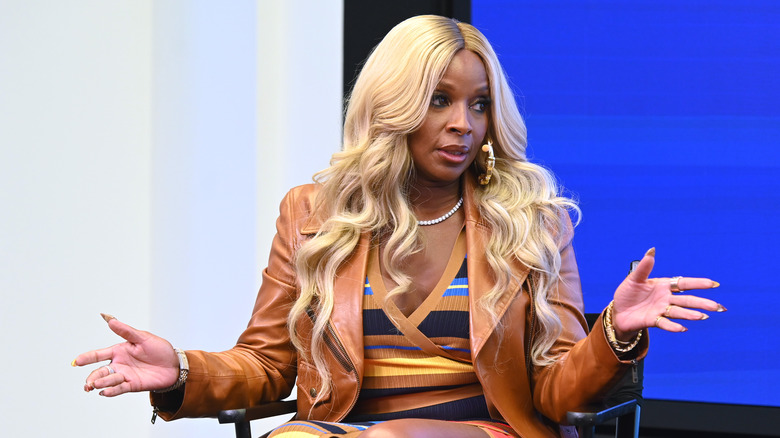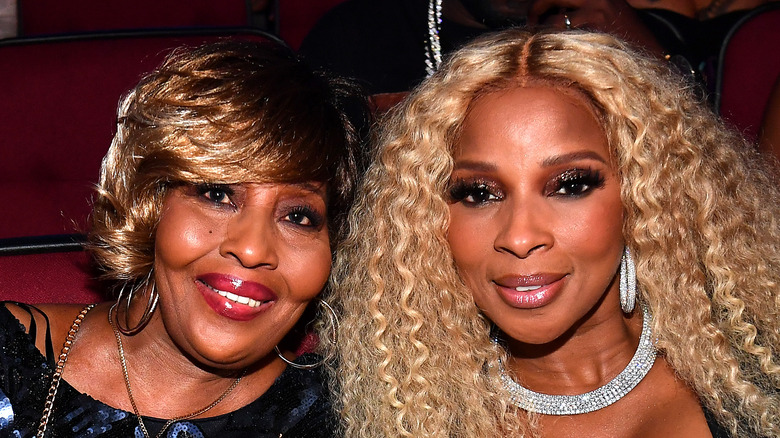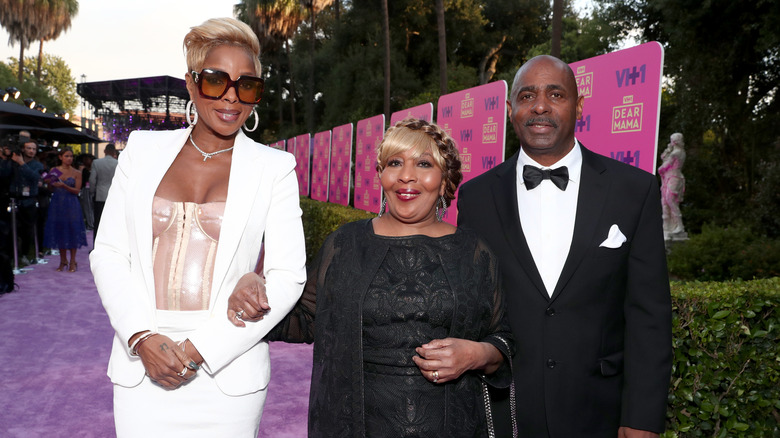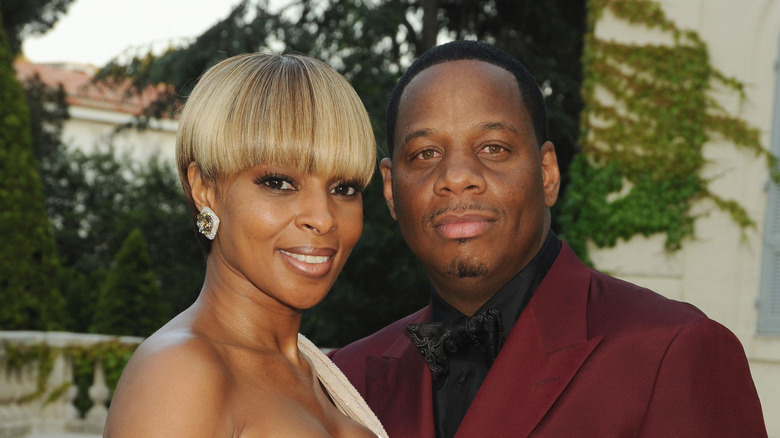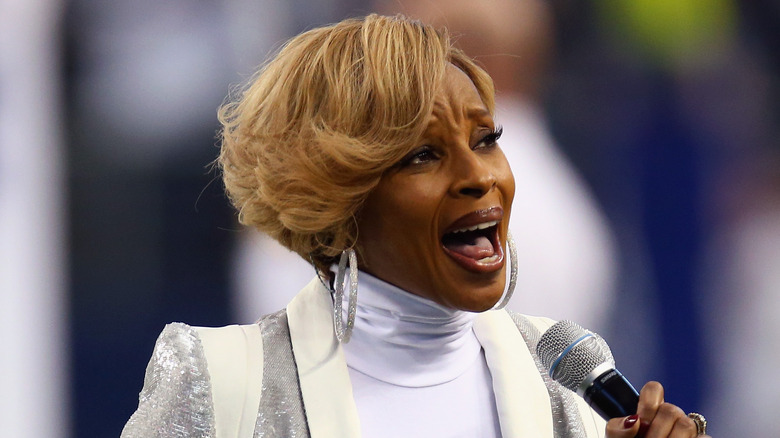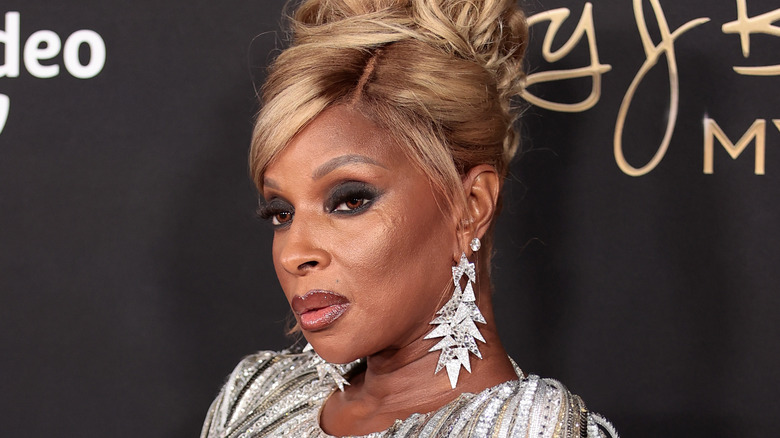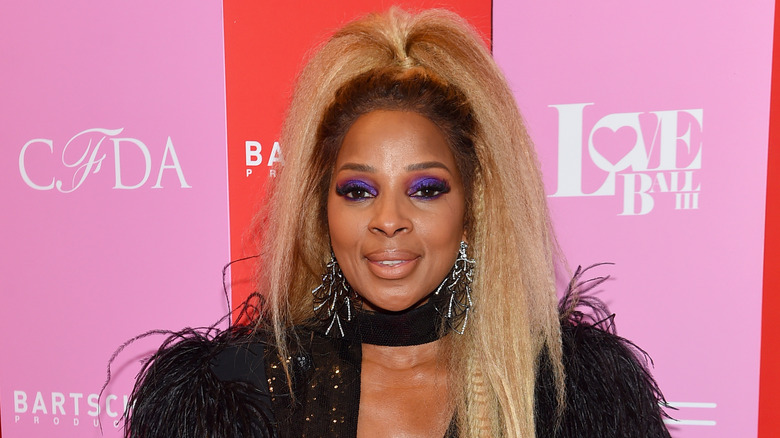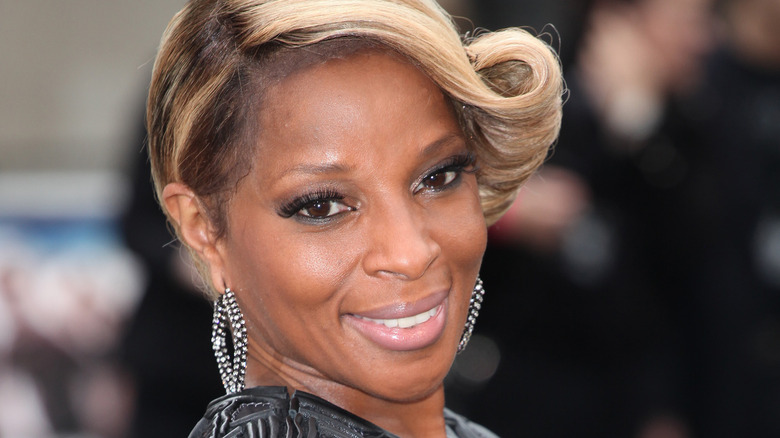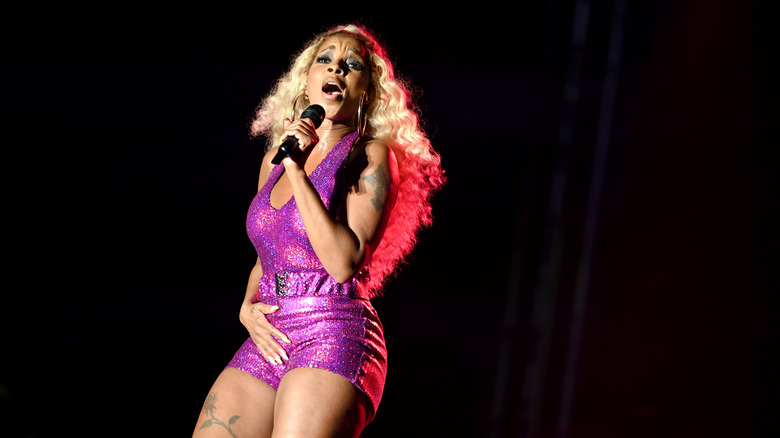Tragic Details About Mary J. Blige
As a musician, Mary J. Blige has built a reputation for herself as someone who can sing about experiencing the most intense emotions and connecting with her listeners through her powerful voice. Music is her outlet for expressing how she's feeling: as she once told Vulture, "If I'm on stage every single night, it can't just be for my fans. It obviously is for me, too."
She's also lived through several difficult experiences and believes that while she's not a fan of pain, she does "know how to deal with it." When she was shooting the 2017 film, "Mudbound," Blige was experiencing serious issues in her personal life but kept her troubles to herself. She later said, "It wasn't anybody's business. I just kept it and gave it all to Florence [her character in the film]."
The musician was forced to confront tough experiences even as a child, living with her mom and sister in Yonkers, New York, and being told that it wasn't safe for her to be alone in the hallway and that she'd "better get upstairs." She said, "The neighborhood was really tough. Everything we saw, we couldn't say — so that was in me." As an adult, she's experienced a rather painful breakup and heartache but believes that she's a stronger person now and said that her role in "Mudbound" taught her that she is a "really powerful woman."
Her dad left the family
Mary J.Blige was born on January 11, 1971, in New York to a jazz musician, Thomas Blige, and a nurse, Cora Blige. Per Biography, her parents had serious problems of their own: her dad was dealing with the aftermath of having fought in the Vietnam War; he had "severe" post-traumatic stress disorder and couldn't support his family, eventually choosing to leave them (via Vulture).
Mary J. Blige told Vulture, "...By the time I was born, he was out of Vietnam, but he wasn't all the way there. I guess him leaving us at an early age was a part of him wanting to escape a lot of things." Without Thomas, Cora Blige had to look after her kids on her own which meant that she would spend a long time at work in an attempt to make sure that her kids were well-fed. Several years later, the singer later revisited her story in a documentary called "My Life" and admitted, "You don't understand the pain you're in or going through until you're older ... so now looking back, it's like, 'Wow.'"
If you or someone you know is struggling with mental health, please contact the Crisis Text Line by texting HOME to 741741, call the National Alliance on Mental Illness helpline at 1-800-950-NAMI (6264), or visit the National Institute of Mental Health website.
She quit high school
As a teenager, all Mary J.Blige wanted to do was become a singer. She told The Big Issue that she was fairly rebellious and didn't pay attention to anything her mother told her. At that point, she also decided to leave school instead of concentrating on her education. She said, "When I was in 11th grade, I dropped out of high school. I definitely regret it. I really wish that I had finished getting my education."
Per Oprah, Blige was a difficult kid and even spoke up when the principal questioned her about causing trouble at school: she simply told her what she had witnessed her mom say in the past, "Because I take no s***." Blige admitted that it was not the best approach and said, "I always felt I had something to prove — because 'Mary J. Blige don't take no s***.'"
The singer did something unexpected many years later and studied once again, getting through exams to earn her high school diploma (via The Washington Post). She said, "When I was a child I didn't care about getting an education, and I didn't finish high school. But I got a second chance, and what I came to understand about education is that it is the key to life." Blige even started the Mary J. Blige and Steve Stoute Foundation for the Advancement of Women Now to support women with college scholarships.
Mary J. Blige fought depression
When Mary J. Blige worked on her second album, "My Life," she was struggling with her mental health. She told Buzzfeed that she was "just in a vulnerable, horrible state of mind" and didn't know how to deal with her pain except by creating music. Blige said in a candid confession, "It was painful. I was in so much pain, singing. I was really in so much pain. I was crying singing a lot of those songs, because I would have to leave the studio and still deal with whatever I was dealing with in real life."
She also admitted that she didn't know that her album would help others deal with their own troubles: in fact, after "My Life" became popular, the singer was trying to numb herself in order to not feel so much pain. When she was at her lowest, her fans helped her stay afloat (via People). When she felt like harming herself, she couldn't help but think about them and told People, "I think subconsciously, I was like, 'Oh I can't kill myself now. All these people, somebody's going to come behind me,' because people were too diehard and strong and emotional about this album."
If you or someone you know is struggling with mental health, please contact the Crisis Text Line by texting HOME to 741741, call the National Alliance on Mental Illness helpline at 1-800-950-NAMI (6264), or visit the National Institute of Mental Health website.
She had to deal with addiction
For Mary J.Blige, drugs and alcohol seemed like a good way to forget about her pain. According to SELF, she turned to drugs as a teen to cope with past trauma and found herself getting addicted to substances. She explained why drugs can feel so tempting in general and said, "You're taking drugs so you can go out and feel courageous, or go out and feel beautiful or whatever. You're doing it to cover up something."
However, for Blige, it became important to acknowledge that she had a problem after she experienced loss. Blige told The Guardian in 2008, "I saw my life going down a drain. One of my real close girlfriends died; I thought I was next. And then Aaliyah died ... and I realized I didn't want to die like this, not tragic like this."
She could identify with fellow singer, Amy Winehouse, who died in July 2011 (her death was attributed to alcohol poisoning). Back then, Blige felt like she knew how Winehouse was feeling and said, "I understand exactly what she's going through, and people always ask, 'What advice do you have for her?' Well, I have so much to say to her!" Blige added that she'd done the same and lashed out when she was in a dark place.
If you or anyone you know is struggling with addiction issues, help is available. Visit the Substance Abuse and Mental Health Services Administration website or contact SAMHSA's National Helpline at 1-800-662-HELP (4357).
Mary J. Blige didn't have a good relationship with her family
Unfortunately, things were always a little difficult for Mary J.Blige at home. Per The Guardian, some of her family members were really unkind and she didn't want to be like them. She said, "The environment that I was in – they'll be mad at me, but it's the truth – they were angry, hateful, jealous, ignorant, prideful people ... whatever I do, I came from that. I came from that tree. And that's the reason why I've been considered an angry, mad, ignorant black woman in the music business."
In fact, an aunt of hers told Mary J. Blige that she would not be able to get through high school; others didn't encourage her goals and didn't want her to be ambitious. It didn't help that she didn't have a great equation with her mom: she said that her mom wanted to lead the life that she got to live. Blige explained, "It might be that she's living vicariously through me, but I believe she's gotten real bitter about it. It's probably why we've never really got along."
As for her father, she didn't get the opportunity to see him for several years and found it difficult to have a conversation when she realized that all he felt like doing was talking about his past as a musician. Fortunately, she mended things with her mom later and even celebrated her in the VH1 special, "Dear Mama: An Event to Honor Moms."
Her father was stabbed in a horrifying incident
On January 23, 2014, Mary J. Blige's father Thomas Blige was attacked by his ex-girlfriend in what was labeled as a "domestic dispute." According to The Huffington Post, he was hospitalized and was reportedly critical. The incident took place in Battle Creek, Michigan. Thomas was stabbed thrice: he sustained a neck injury and was taken to a hospital when he had surgery. Meanwhile, police officials tracked down the culprit at her apartment.
Thomas and his ex-girlfriend had a murky past and it was believed that they had "at least seven domestic violence complaints" between them. In the court trial that was held months later, Thomas was quoted as saying, "Me and Cheryl have serious domestic problems. The day before we were fighting and the police were called. We have verbal fights multiple times. An enormous number of times" (via USA Today).
According to Page Six, Cheryl White was later sentenced to 365 days in jail and was ordered to pay over $17,000 to cover Thomas Blige's medical fees. The family chose to stay mum and didn't issue a public statement.
If you or someone you know is dealing with domestic abuse, you can call the National Domestic Violence Hotline at 1−800−799−7233. You can also find more information, resources, and support at their website.
Mary J. Blige's divorce was ugly
Mary J. Blige was struggling to raise herself up when her marriage with Martin Isaacs broke down: according to Associated Press, the singer admitted that she had suffered for several years before the couple decided to call it quits. She said, "I don't know if people seen the last eight or five years of my life, but it's been hell. And it's been ugly and it's been public and it's been nasty."
She added that when everything was falling apart, she tried her best to save her marriage and found herself "fighting for ... [her] morals." Post the separation, the singer was told by a judge to cough up $30,000 as "temporary spousal support." She told Variety that she was not feeling great about a lot of stuff and added, "I thought someone loved me, right? Turns out, he was a con artist and he didn't, and now he's coming after me for all my money. When you come out of something like that, you realize you were never the one. There was someone else that was his queen."
Blige later even revealed in a VH1 documentary, "Strength of a Woman" that her husband had cheated on her with someone she had mentored in the past: actress Starshell. She told rapper Ne-Yo, "All these years have come to this, like, you didn't even pick me, you picked somebody else. That s*** is humiliating"
Recording an album after her divorce was painful
Mary J. Blige was working on her album, "Strength of a Woman" before her divorce was finalized. According to Page Six, she decided to use the album as an outlet to sing about everything she was going through. Before the divorce, when she was still hopeful, she wrote about "fighting" for her relationship but modified the entire album after the marriage fell apart. It made sense: the singer had just gone through a devastating break-up. She said, "There was no moment where I felt like I was going to keep this in because it was way too much for me to handle on my own."
The singer added that she knew that it was important for her to release those emotions and said, "I needed to express myself and so it hurt, but it's good. It's good." Her album was a rollercoaster that was included songs like "Glow Up," which focused on revenge, and a hopeful number titled "Smile," which was about moving on and loving once again. Blige admitted, "My music is therapeutic to me."
She grew up surrounded by abuse
According to CNN, Mary J. Blige witnessed a lot of tragedy as a child and said, "...I saw so many women beaten to death, almost to their death, by men." Blige decided that when she'll grow up, she will do something to reach out to other women in need. The singer explained, "As a child, I [saw] women really, really suffer terrible, terrible situations, and I vowed as a child to want to do something — anything — that can help them have better self-esteem so that they don't have to be subjected to men that wanted to kill them."
Blige kept her promise and started The Mary J. Blige Center for Women in a bid to offer support to women who needed help. She said that the center would have doctors, psychologists, and daycare centers. She stated, "Anything that you need or they need to be able to better themselves is here for them."
Back in 2002, the singer was attacked by her ex-boyfriend (via The Guardian). Blige said that he tried to kill her and used "weapons" but refused to divulge more details. That incident was a turning point for Blige and who told herself, "I can't do this no more."
If you or someone you know is dealing with domestic abuse, you can call the National Domestic Violence Hotline at 1−800−799−7233. You can also find more information, resources, and support at their website.
Mary J. Blige has spoken about feeling lonely
Mary J. Blige isn't afraid to admit that she's not always happy on her own and gets lonely at times. She told Taraji P. Henson's on the Facebook series, "Place of Peace" in 2020 that the holidays can be especially tough to get through when she's all by herself. The singer was incredibly vulnerable when she revealed, "It gets lonely and it gets sad, but I just gotta thug this out until something excellent comes along. I don't know when that's gonna happen. But I'd rather be [by] myself than to keep making the same mistakes over and over again."
Blige also said that she is trying to be "patient" and focusing on self-love, on getting through the days slowly and steadily. However, she added that she won't "deprive" herself in the future and said, "I'm not gonna deprive myself of romance if it ever shows up."
She hates being vulnerable
This one may not be too obvious but it is not easy for Mary J. Blige to open up about her deepest and darkest secrets. According to SELF, for several years, she resisted therapy and didn't want to talk about her feelings because she was afraid that someone may misuse the information and thought about "how people would do anything for money, and how anybody at any moment can become paparazzi."
Blige also said that her music may make it seem like she is often transparent about everything but she makes conscious decisions to keep certain things to herself. She said, "You only know what I tell you. And I don't tell everything." The singer is reserved even when she's among loved ones and chooses to divulge information only if she's sure it won't be painful for them to hear. She gave an example and said, "I still can't tell my mother everything that happened in that marriage."
The singer struggled to love herself
Even though she's a well-known celebrity and a musician who has made a mark for herself in the industry, Mary J. Blige has found it really tough to embrace herself fully. According to Elle, she didn't like the way her hair looked as a teen and felt like a bit of an outsider at school. She said, "Because of the texture, growing up I always wished I had wavy hair. Every little Black girl wanted wavy hair."
Later, as an adult, she experiment with her appearance but was forced to confront her insecurities while shooting the film, "Mudbound." She had to let go of heavy makeup and opted for a simple look with a bun. What helped her was receiving compliments from the rest of the team on set. She started using self-affirmations and telling herself, "This chick is beautiful." The film helped her beat her insecurities and she stopped relying on things like makeup and wigs to feel better about herself. As Blige said, "I started to believe it [that she's beautiful] and started to pay myself high compliments to get past that feeling and that fear."
